Snails are one of the most common creatures on Earth. They live long and go through various life stages. It’s very interesting to study their breeding as they grow exponentially. In the following, you’ll learn about the breeding frequency and how snails breed. Moreover, why does someone love to keep them? The article ends with various methods to prevent snail overbreeding.
Content Table
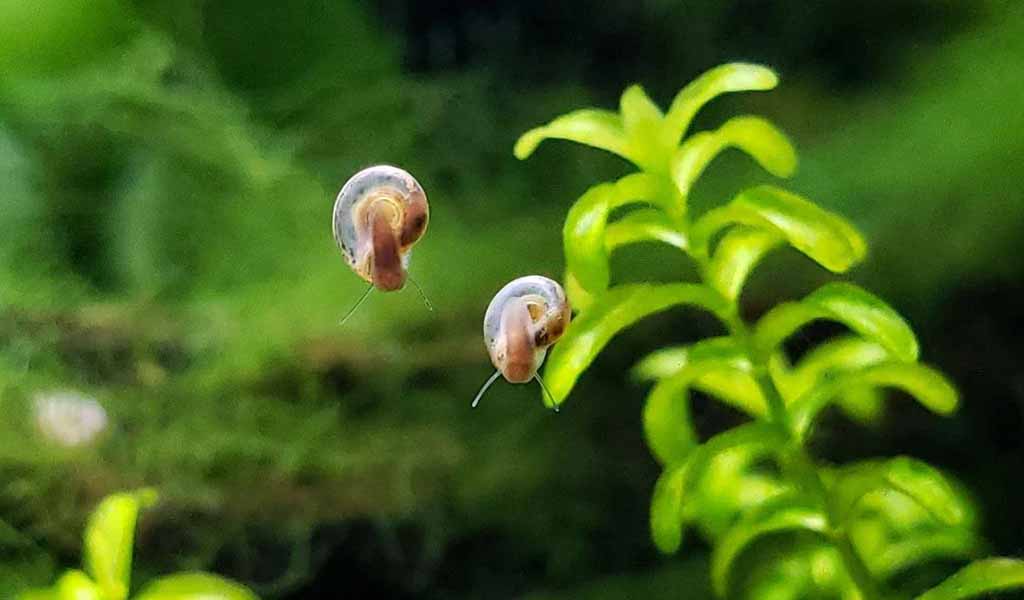
Snail breeding in tanks
Snail Lifespan and Breeding
Snails are gastropod animals characterized by a hard enclosing shell. This shell acts like a shield, i.e., they retract their entire body within it. They belong to the phylum Mollusca and are active in the wet season and rest in winter.
Snails live on both land and water, i.e., freshwater and saltwater. In the ocean, they are present at various depths. Here is the life expectancy and breeding process of these cold-blooded animals.
Life Cycle
Usually, a snail can live up to 15 years. Here are the different growth stages.
Egg
Sometimes, snails exhibit a hermaphrodite nature, i.e., a snail lays and fertilizes eggs by itself. Usually, a snail lays clutches of eggs, and others fertilize it. Usually, they do it in late autumn or early spring.
Young/juvenile
After two to three weeks of fertilization, hatchlings begin to emerge. While hatching, they eat their eggshells. Sometimes, they also feast on other eggs. At this stage, their shell grows, and they continuously eat to maintain this procedure.
Adolescent
They reach the adolescent stage during summer. Therefore, they go to the aestivation period. They do so to avoid water loss in the harsh summer season. If there is rainfall, they might be active for a while. However, shortly after rain, they again go to the aestivation period. They don’t breed at this stage.
Adult
Once they survive summer, they reach sexual maturity. They become sexually mature after two to three weeks of autumn. They form pairs and begin breeding, and the cycle repeats itself.
How Often Do Snails Breed?
They mate a couple of times. Usually, snails lay 5 to 6 clutches of eggs each year.
How Do Aquarium Snails Breed?
There are two ways of snail breeding.
| Asexual Breeding | Sexual Breeding |
Asexual Reproduction
Numerous snails do asexual reproduction. They don’t require partners, as they are Hermaphrodites. They lay and fertilize their eggs by themselves. New Zealand mud snails, Ramshorn snails, Giant African land snails, etc., are examples of such species.
Sexual Reproduction
Two snails attract each other. Before mating, they engage in courtship. During courtship, they stab a calcium dart into the partner, as it increases the chance of paternity. After that, they mate with each other. It takes several hours. They lay eggs within 3 to 6 days after mating. The number of eggs per clutch depends on the species.
Breeding Different Aquarium Snails
| Type | Breeding type | Number of eggs per clutch |
| Mystery snails | Sexually | 50-200 |
| Assassin snails | Sexually | 1 |
| Nerite snails | Sexually and Asexually | 30-100 |
| Rabbit snails | Sexually | They give birth to offspring instead of eggs |
| Bladder snails | Asexually | 10-40 |
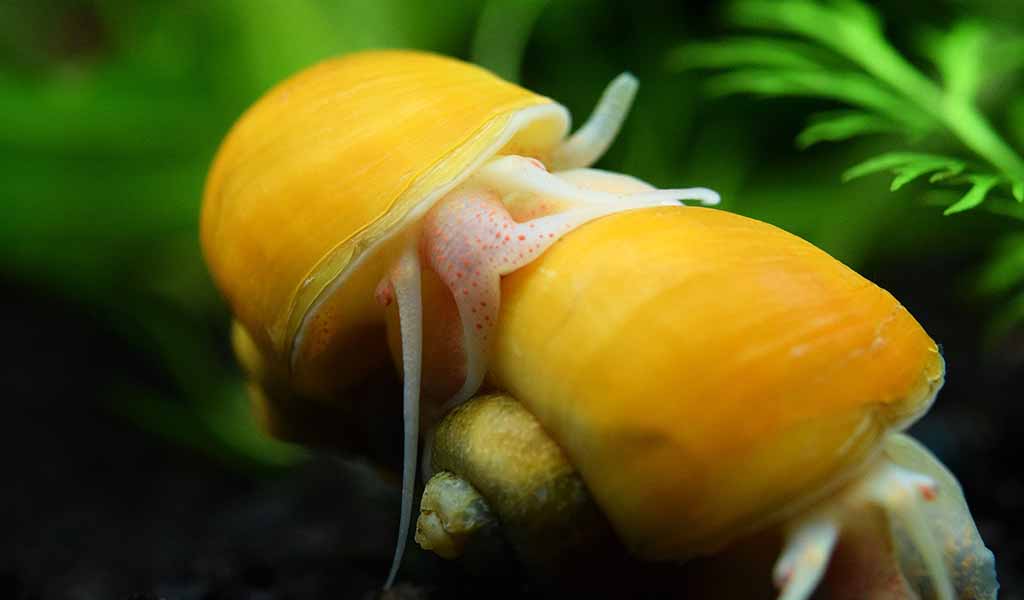
Prevent snail overbreeding
Breed Aquarium Snails
Aquarium snails are interesting to keep as pet in tanks. They cause many positive vibes. Therefore, aquarists love to keep them. Here are some benefits of having these slow-moving creatures.
Algae Eating
Algae are a staple food of many snail species, i.e., nerite and mystery snails. Their presence in the tank helps to clean the tank’s glass, plants, and hard scapes.
Waste Recycling
Aquatic pets cause waste in the aquarium, and it causes many problems in aquariums, e.g., ammonia spikes. Snails eat these decaying materials, i.e., uneaten food, rotting plants and leaves, and fish waste, and keep the tank clean.
Fertilization
Snails are an excellent and natural resource for tank fertilization. They help in two ways, i.e., with their waste and equally nutrient distribution in the tank. Their waste contains nitrogen, potassium, and phosphorus. These macronutrients help in proper plant growth.
They move through the substrate. While doing so, they equally distribute the nutrients. Moreover, doing so causes natural aeration in the tank, and improves plant growth.
Aqua Pets
Some aquarium snail species have interesting habits, which make them aqua pets. Such snails include Nerite, Mystery, Inca, Rabbit, and Assassin.
Aquarists love to keep some snail species in their tanks.
| Specie | Why Keep in the Tank? |
| Mystery | Improve the aquarium ecosystem Peaceful Exhibit vibrant colors |
| Assassin | Helps to control the snail population by feasting on other snails. Exhibit interesting color patterns Easy to take care of Great compatibility with fish species |
| Nerite | The best algae eaters. Suitable for nano tanks, i.e., less than 1 inch |
| Rabbit | Help to maintain water parameters Bring curiosity Peaceful Algae eater and substrate scavenger |
| Bladder | Live food source for large fish and other snails
Help to clean the tank |
Tricks to Prevent Snails from Overbreeding in Tanks
Snails multiply their offspring at a great rate. If you don’t prevent their over-breeding, they will overwhelm your tank. Ultimately, your aquarium will lose its shape. Here are some tricks to control the snail population in the tank.
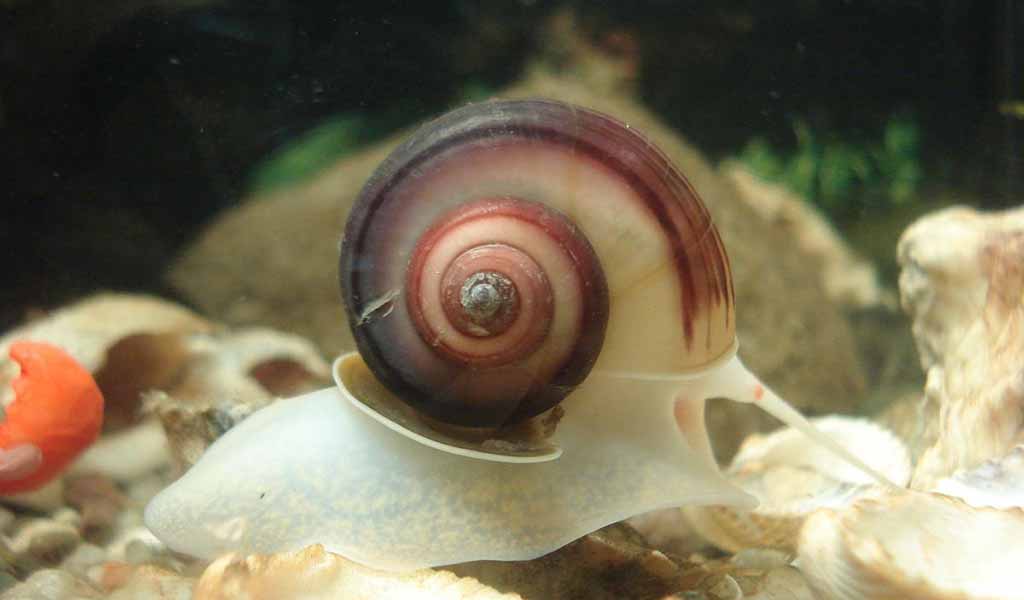
Breed aquarium snails
Improve Food Supply
Snails eat the fish’s leftover food. If you control the fish food supply, it will help to prevent snails from overbreeding in the tank. Here are two ways to have control of the food supply.
| Improve the food quality so that fish can eat all the food. |
| Supply only such a quantity of food that the fish can consume within minutes. |
They also eat algae. Regularly remove the algae from the tank by using some aquarium cleaner tools.
Manual Removal
If you want sudden population control in the tank, manual removal will help you. You can use your hands to remove the snails from the tank. If you feel uncomfortable, use an aquarium siphon. Put one end in the densely populated area and open the other end of the pipe into a bucket.
Food as Bait
Some snail species are nocturnal, i.e., active during the night. These snails love to eat vegetables, e.g., cucumber, zucchini, carrot, or lettuce. Put the pieces of these vegetables overnight in the tank. Snails will come to eat them. In the morning, you can easily remove the piece from the tank with snails.
Other than vegetable pieces, you can put the vegetable pieces in hollow containers. These holes should be wide enough to allow entry but restrict exit. They will enter the can and be unable to get out of it.
Natural Predators
Some fish and snail species love to eat snails. So, you can deploy them to control the snail over-breeding population. All puffer fish wholeheartedly eat snails. Numerous loaches also use their pointy snout to eat snails. Assassin snails are the natural snail predators. So, put them in your tank and observe the decline in the population curve.
Quarantine
Prevention is better than a cure. Sometimes, plants, decorations, and aquatic pets bring snails with them. Therefore, it’s better to quarantine them before introducing them into the tank.
Reduce Hiding Spots
Snails lay their clutch in some hidden spots. Therefore, it’s better to reduce such hidden places in the tank. If you can’t do that, clean these hidden spots regularly to remove clutches from the tank.
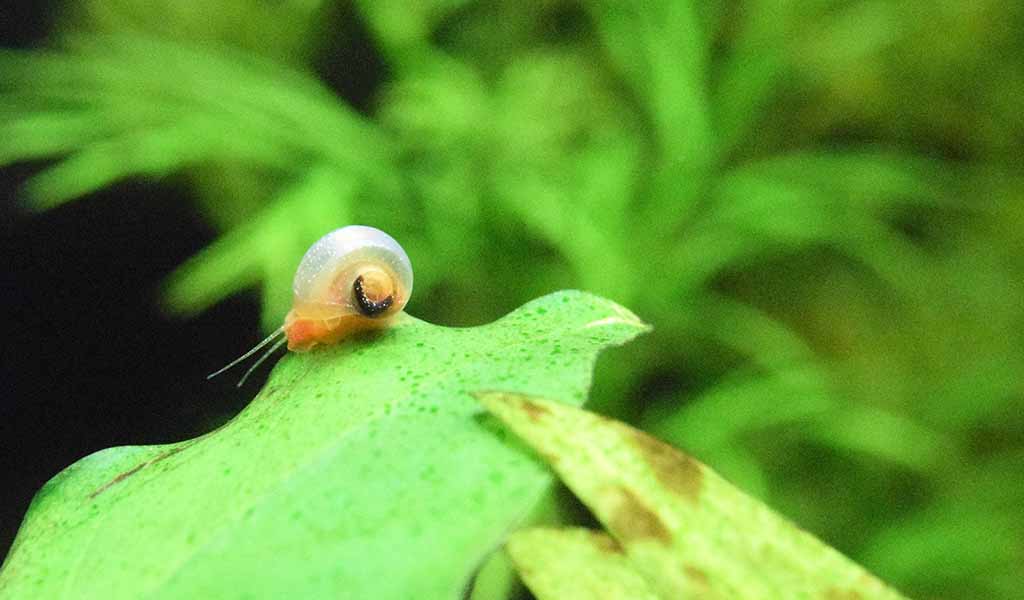
How do snails breed
The Gist
Snails are one of the most common species around the globe. They reach sexual maturity by passing through various stages. They breed in both sexual and asexual ways. Aquarists love to keep them as they keep the tank clean, increase fertility, and aeration the tank. However, due to their exponential population growth, snail overbreeding is prevented.
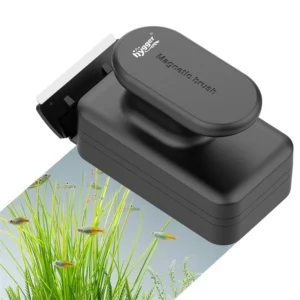
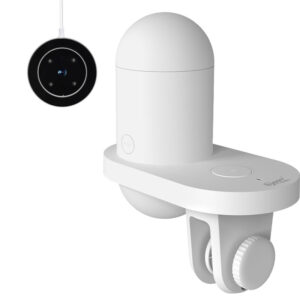
Leave a comment